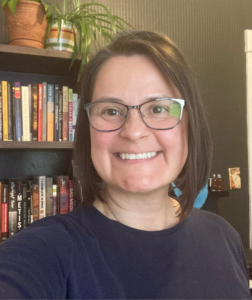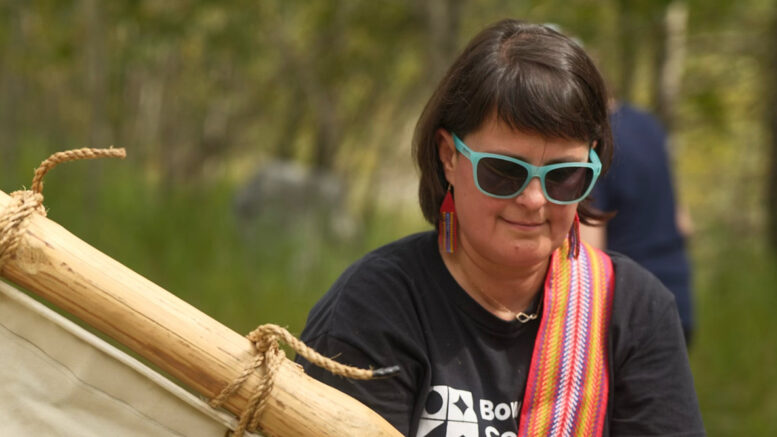By Laura Mushumanski, Local Journalism Initiative Reporter
(ANNews) – Take your left hand and place it at the back of your head and now take your right hand and place it on top of your tailbone — the distance between your two hands is the longest running nerve in your body, the vagus nerve. The lower end of this nerve is where your nervous system allows you to feel safe and connected — whole. And when we feel like ourselves, that is what being grounded and connected to our spirit is.

Jaime Fiddler
It takes an incredible amount of courage and leaning into doing things that feed our spirit — despite feelings of uncertainty, doubt or fear. This was the course of action our Métis sister Jaime Fiddler walked with that eventually grounded her and allowed her to share her gifts with the world.
“Reconciliation is about building a different future. Right now, we are kind of stuck by our past, we could repeat those harmful patterns.”
Bringing wholeness into space, reconciliation — Fiddler came to this understanding of being in a state of wholeness when one of her mentors during her master’s program shared with her, “I am seeking to be whole.” This sparked Jaime’s curiosity, what being whole meant, that lead to walking with the etymology of to be whole. “It comes from the sense of safety, to be safe, to be your whole self and to tell your whole story. I thought ‘yes, that is what I am trying to be,’ those are the spaces where I feel most at home, where I can be my whole self.”
Fiddler grew up in a fractured way, “I knew I was different. Out of love, I was told to hide being Métis about myself. It also wasn’t okay to be queer. I learned to hide and really swallow parts of myself… and in my adulthood, a big part of my journey was bringing those parts of myself back together.”
Being Métis and wanting to find identity and go about it in a good way, Fiddler was not open about who she was. “I would tell people I was Métis if they asked, but I wasn’t sure how I fit into the Métis story unless it was in a reciprocal way.” When Jaime was eleven years old, she obtained her Métis card, fondly remembering her father sharing insight, that “having a Métis card also supports the community. It supports them to know that there’s a lot of Métis people here, and what am I doing to help if I am also benefitting?”
“Maybe I carried that lesson forward,” Fiddler said.
Eventually what Fiddler carried forward landed into her research within academia — about how people navigate identity in spaces. “I pursued in my graduate work, the experiences of teachers who left the classroom early, and in my PhD teachers who stayed. It is not always possible to be the type of teacher you want to be in certain circumstances. I was curious about how people navigate that space — how do you navigate your identity if you don’t feel like you can have integrity in a space?”
As Fiddler found wholeness in her own life, things started to shift within her professional world that aligned with her personal life, now being married to her wife Evelyne. “When I started teaching at the University of Calgary I started teaching Indigenous education classes, and diversity in education. I was starting to feel more settled in my identity… where I could enter into this space.”
This led Fiddler into understanding reconciliation and how to walk with this understanding, deriving from finding her own identity and how to go about things in a good way. “I also started teaching in the Call-to-Action Indigenous Education program — which is all about people who want to contribute to reconciliation. They want to bring that work into their work — whatever that work is — people who just want to know where to start.”
Fiddler is currently the learning design consultant for curriculum Indigenization and decolonization at Bow Valley College, where she combines her understanding and knowing of Indigenous history by bringing stories into teaching. How she approaches teaching is rooted in humility, understanding that reconciliation is building a different future — a way of walking in the world and operating from a perspective of abundance, harmony, and reciprocity.
“I think that it’s really challenging work because we don’t really know what that looks like… what does a reconciled future look like? What does it feel like? How is it different? … We are so used to operating from principles of scarcity and competition — what would it actually be like to operate from a perspective of abundance, harmony, and reciprocity? Our First Nations cousins carry this knowledge, and historically Métis communities learned these ways of relating, but since colonization this has not been the mainstream way of being. So today, we don’t really know what this might look like, we need to each learn and imagine that in our own way. We need to think about what the next action is and move towards that — to move away from these colonial patterns into something new.”
Within the understanding of reconciliation — where this is not something simple that can be defined, it is a matter of working towards something different by building a cycle of learning and acting. “Everyone needs to find their own way to contribute to reconciliation. You do need to understand the truth of our shared history, where we are — lots of people don’t know where we are, and I am definitely always learning more about where we are and how we got here. Then I think about what I am called to do in this story to shift towards something new.” These understandings are parallel with what Fiddler walked with when finding wholeness in her own life, ways she came to understand, to find a sense of safety in her own identity.
“Ultimately the actions you take are yours — a lot of people are fearful — but once we start acting, then we can grow in this cycle of learning and acting, and then we can collectively move towards something else… It is a future where we can all flourish — that is the end goal…It is not possible for anyone to flourish unless everyone does. There is always this sense of when I am doing well but people around me are suffering—that is also a kind of suffering. All flourishing is mutual… when I feel really frustrated, that is what I come back to, we are working towards something different and it involves people learning how they can contribute.”



Be the first to comment on "Reconciliation and a flourishing future with Jaime Fiddler"